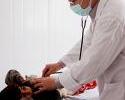For the very first time, scientific researchers have identified a link between pregnant women with polycystic ovarian syndrome and offspring born with a higher risk for autism.
The Study
Kyriaki Kosidou, lead researcher of the Department of Public Health Sciences at Karolinksa Institutet in Sweden and her colleagues published the findings of their study in Molecular Psychiatry.
Autism is a developmental brain disorder and it is characterized by social, behavioral and communication problems. Currently, statistical information has shown 1 in 68 children in America have the disorder which is an increase from 1 in 250 children as of 2000.
While the precise causes of autism are not known, past studies have suggested an infant’s exposure to androgen, a sex hormone, may influence development of the condition.
Both men and women produce androgens, such as testosterone and androstenedione. These hormones are often called “male hormones, “because they play an important role in male traits and males produce them at higher levels than a female. These hormones also contribute to fetal brain development.”
The production of androgen is increased in women who have polycystic ovarian syndrome, which is a condition that affects ovarian function. Bearing this in mind, Dr. Kosidou and the research team set out to investigate if PCOS during pregnancy may influence autism development in a woman’s offspring.
PCOS and Autism Risk
To come to their conclusion, the team used the Swedish health and population register databases to get information regarding children aged 4-17 years old, who were born in Sweden between 1984 and 2007.
The team identified 24,000 children with autism and compared the information with 200,000 children without it.
Compared to the children born to women who didn’t have polycystic ovarian syndrome, those born to females diagnosed with the condition during pregnancy were found to have a 59 percent greater chance of developing autism.
The risk of autism in a child is even greater in children who are born to women who had PCOS and suffer from obesity; such women tend to have higher androgen levels.
While autism occurs more commonly in boys than girls, the team states they have identified no gender differences in autism in children born to women with PCOS.
The research team was not able to identify the precise reasons for the findings, but they question that there could be an association between maternal polycystic ovarian syndrome and increased autism risk through way of increased androgen levels.
According to the team, it’s also possible for autism and PCOS to share genetic factors and the association could also be the result of other metabolic issues that are common among women with PCOS.
Conclusion to the Study:
The research team states further studies are necessary to replicate their findings and to discover the underlying mechanisms responsible for the increase in autism.
Until future studies are done, senior study author Renee Gardener, also of the Department of Public Health at Karolinska, says it’s too early to make clinical suggestions for pregnant females with PCOS, “though increased awareness of this relationship might facilitate earlier detection of ASD in children whose mothers have been diagnosed with PCOS.”

![© Milan Nykodym, Czech Republic [CC BY-SA 2.0 (http://creativecommons.org/licenses/by-sa/2.0)], via Wikimedia Commons © Milan Nykodym, Czech Republic [CC BY-SA 2.0 (http://creativecommons.org/licenses/by-sa/2.0)], via Wikimedia Commons](https://www.brainphysics.com/sites/default/files/images/Pregnant_woman_(4977966488).news3.jpg)


![By gilmae from Sydney, Australia (Flickr) [CC BY-SA 2.0 (http://creativecommons.org/licenses/by-sa/2.0)], via Wikimedia Commons By gilmae from Sydney, Australia (Flickr) [CC BY-SA 2.0 (http://creativecommons.org/licenses/by-sa/2.0)], via Wikimedia Commons](https://www.brainphysics.com/sites/default/files/images/256px-Girls_playing_in_a_small_pool.thumbnail.jpg)
![By Digitalkil (Own work) [Public domain], via Wikimedia Commons By Digitalkil (Own work) [Public domain], via Wikimedia Commons](https://www.brainphysics.com/sites/default/files/images/Human_Semen_in_petri_dish.thumbnail.jpg)
![By Aneta Meszko, Marcin Meszko (Aneta Meszko) [CC BY-SA 3.0 (http://creativecommons.org/licenses/by-sa/3.0)], via Wikimedia Comm By Aneta Meszko, Marcin Meszko (Aneta Meszko) [CC BY-SA 3.0 (http://creativecommons.org/licenses/by-sa/3.0)], via Wikimedia Comm](https://www.brainphysics.com/sites/default/files/images/Nina_skrajny_wcze?niak.jpg)

![By Øyvind Holmstad (Own work) [CC BY-SA 4.0 (http://creativecommons.org/licenses/by-sa/4.0)], via Wikimedia Commons By Øyvind Holmstad (Own work) [CC BY-SA 4.0 (http://creativecommons.org/licenses/by-sa/4.0)], via Wikimedia Commons](https://www.brainphysics.com/sites/default/files/images/Gravid_-_pregnant_woman.thumbnail.jpg)